The II meeting took place from 21th to 25th January 2019 in Puerto del Rosario. Here is the report on the activities.
19.01.19 Arrival of the German and Norwegian groups to Fuerteventura on the afternoon. Accomodation at the appartements in the city.
20.01.19 Meeting at 10:00 in front of the school with the spanish students and teachers Inma Jordán and Raquel Sánchez and the guests from Norway and Germany. Trip by bus through the island. First stop at a goat farm in Betancuria, where we visit a cheese factory. We learn about the traditional farming of goats in the island and some other traditions.
Later we visit the village of Betancuria, first capital of the island, and we learn a bit about the history of the Canary islands. 
From there, we travel to the South, to the village of Morro Jable, where we have lunch and enjoy the beautiful beaches. Students stay together, and know each other better.
Return to Puerto del Rosario arriving at 19:30. Students meet the finnish students, that have arrived in the afternoon. Teachers also meet the finnish partners.
21.01.19 Meeting at school at 8:30. Welcome from the school Principal Mrs. Maria del Carmen Montelongo González. Information about the week plan from the spanish coordinator, Raquel Sánchez. Short visit to school facilities. At 10:30 talk from Mr. David Cuartielles, co-founder of the ARDUINO technology, and design teacher at the Malmö University in Sweden. Mr Cuartielles has come from Sweden specially to be with us today. We counted on the cooperation of the island government (department of new technologies), the Teacher training Center from Puerto del Rosario and Aula 3i (an initiative to spread STEAM subjects among school pupils of the island). He tells about the origin of Arduino technology, the philosophy behind the concept, based on participation, collaboration, transferability, and knowledge sharing. He shows us some amazing project examples run on the ARDUINO platform. He informs us about the ARDUINO day, that takes place every year. Schools can register any event they want to run based on Arduino, and this event appears on the ARDUINO webpage, with millions of visitors around the world.

We have a coffee break at 11.00 at the school restaurant. Lukas from Germany celebrates his birthday, so he gets a cake with candles and a band from the spanish students, and everybody celebrates singing “Happy birthday” to him.

After the break, we go to the technology lab, where Mr. Cuartielles explains the challenge to the students. International groups are splitted in two, with supervision of one of the tutor teachers.

The 8 groups must build a keyboard or joystick that allows them to play a video game they choose. The control device must be built with cardboard and connected to an ARDUINO board. Mr. Cuartielles gives an example, and explains the groups how to program the ARDUINO board to make the control device work. The following 2 hours the groups work intensely to have the device ready.

They cooperate together, sharing ideas, drawing and building, under the supervision of teachers and Mr. Cuartielles. Some teacher from other schools and from Gran Canaria, have come to listen to Mr. Cuartielles, and also take part on the challenge. The local radio and TV interview some of the participants, and shares the news on their social networks. After school, students have free time, and some teachers from all partner schools gather for lunch with Mr. Cuartielles.
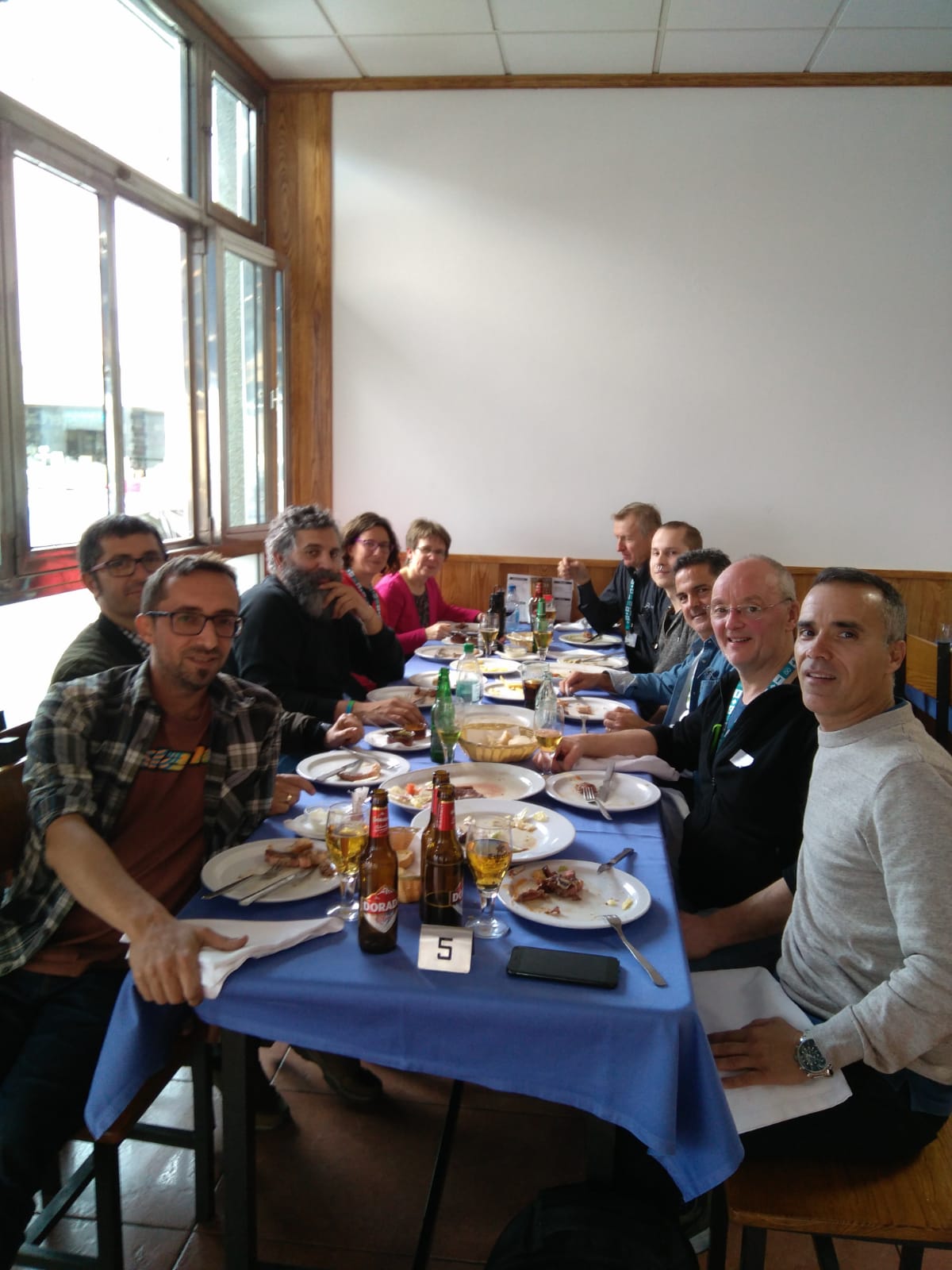

In the evening, Mr. Cuartielles gives another talk to interested teachers from every school in Fuerteventura, at the technology park of the island, spreading the impact of our project, because many other teachers can profit from our lecturer.
Students meet spontaneously in the evening to have pizza and celebrate Lukas’ Birthday again.
Link to tv. interview: https://www.facebook.com/ondaftv/videos/354442882003284/?t=1
22.01.19 We meet at school at 8:30. We go to the computer room. The spanish students Marina Palacios and Marta Gancedo run a workshop in Tinkercad, a design platform. All students follow their instructions and learn a little about how to use this open source platform.

Marte Lundberg and Laila Juliussen arrive to school from the Norwegian partnerschool. They are interested in knowing the school at Fuerteventura, to explore the possibility of cooperating in a future Erasmus+ KA1 project for vocational students.
Fernando Jerez, a design teacher from CIFP Majada Marcial runs a workshop after the break on Open S Cad software. Students generate different designs, and the winner is printed out with the 3D printer. Fernando shows the students some of his designs.
In the evening, at 17:00, the IES Puerto del Rosario organized a presentation of all their european projects. They are running 3 different projects right now. Families, teachers and school authorities are invited to the presentation. Our project was presented by the spanish coordinator Raquel Sánchez, and the 4 spanish students who attended the 1st. meeting in Norway explain their experience, and all they have learned there. The Canarian ministry of education attended the presentation and closed the act wishing all good luck with the projects, and highlighting the importance of the european projects for a better future of our youngsters.

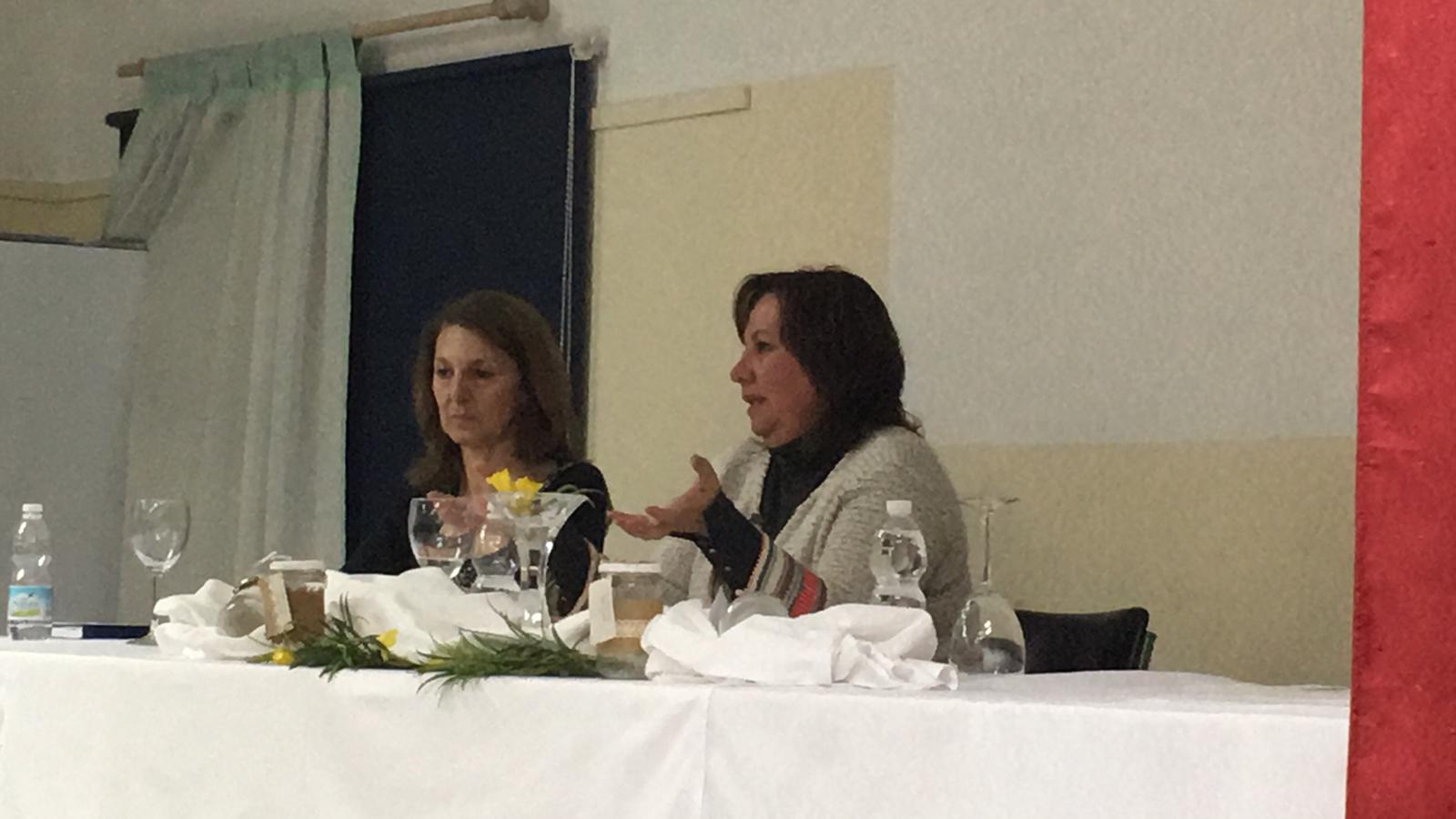
The canarian TV was present, and the news about the project appeared on tv.
After the meeting, the hospitality department offers a snack to all participants at the school restaurant.
http://www.rtvc.es/television/multimedia/Telenoticias%202-1937/22-01-19-2033.aspx#.XEefOaQWWEc Minute 25.
23.01.19 Students and teachers meet at 8:30 at the Technology workshop. The tourism students have prepared some presentations in English about the island, and they present them to the partners. Afterwards, Patricia and Marina (Spanish students) are in charge for the ARDUINO lessons. Students work in international groups, following the lessons prepared by the spanish teachers (in the etwinning page).

After the break, teachers meet at the german department, and discuss about the difficulties found until now, and the steps we should agree on for the next period.
In the meeting: Raquel, Christoph, Susanna, Peter, Kari, Eemeli, Gisle, Halvor, Javier, Jose
Challenges
1. Addressing the biggest problem, international group between meetings.
- The problem is to find time for skype meeting, and it takes a lot of time to get skype work.
- The problem is also that the students don't know what to do. Now it is to unspecified and the task in itself is hard because we have not simplified the main task, to remove trash.
- The problem is also that students come and go because they change schools and finish.
2. The students don't know what exactly to do, and neither do we. So, we need to specify more details around the project.
1. Solutions:
- Every school work independently between meetings on a specific task.
- Every student give feedback about what they want to work with, in terms of code, drivetrain etc.
- Setting the task, and the teacher need to choose what's possible to do in every school.
- Every nationality work with the same problems and share in international groups when we meet. Then the international group choose by themselves what kind of solution they want to use on their robot.
2. Need specific project details.
- Make a map that's already made. 2x3m and use bottles and cans.
- Define the what is include in the task, how many objects, what type of objects, where they should be stored.
- Should the robot be controlled by a joystick, or autonomous.
- Susanne shows a diagramm she has worked in with her students. It shows the different components of the robot, that the teams must take into account. We agree that motors and batteries can be deleted from the decision list, because the motors and power supplies provided with the arduino sets are ok. Students should concentrate in Wheels/chains, platform, garbage collection device, and coding. The sensors will be discussion point for the next meeting in Germany.
TO DO:
- Need to a list of all team-members and contact information. The list is already at Etwinning. So, we need to fill out.
- Germans make the design of the landscape.
- Need to present to the students different platforms, and let them decide.
- 08.00 tomorrow show the students the map, and the specified task.
The evening is free for everyone.
24.01.19 We meet at 8:00 and Susanne Rielage and Christoph Schopohl present the design they have made of the landscape where the robots must work. They have also prepared a list of conditions for the robots and a closer description of the task. Students discuss about it.

At 9:00 Paola Guimerans starts her workshop on e-textiles. She presents examples on the different fields where this technology can be used (from health, to fashion or sport). This perspective integrates technology with arts and fosters equity and inclusion of girls in STEM areas. Paola Guimerans has come from Galicia, with the cooperation of external institutions (Island government, Teacher training center and aula 3i) She has been running workshops on educational use of e-textiles for interested teachers on tuesday and wednesday, so that more schools can profit from our activity. This cooperation spread the impact of our project to neighbour schools from the whole island.
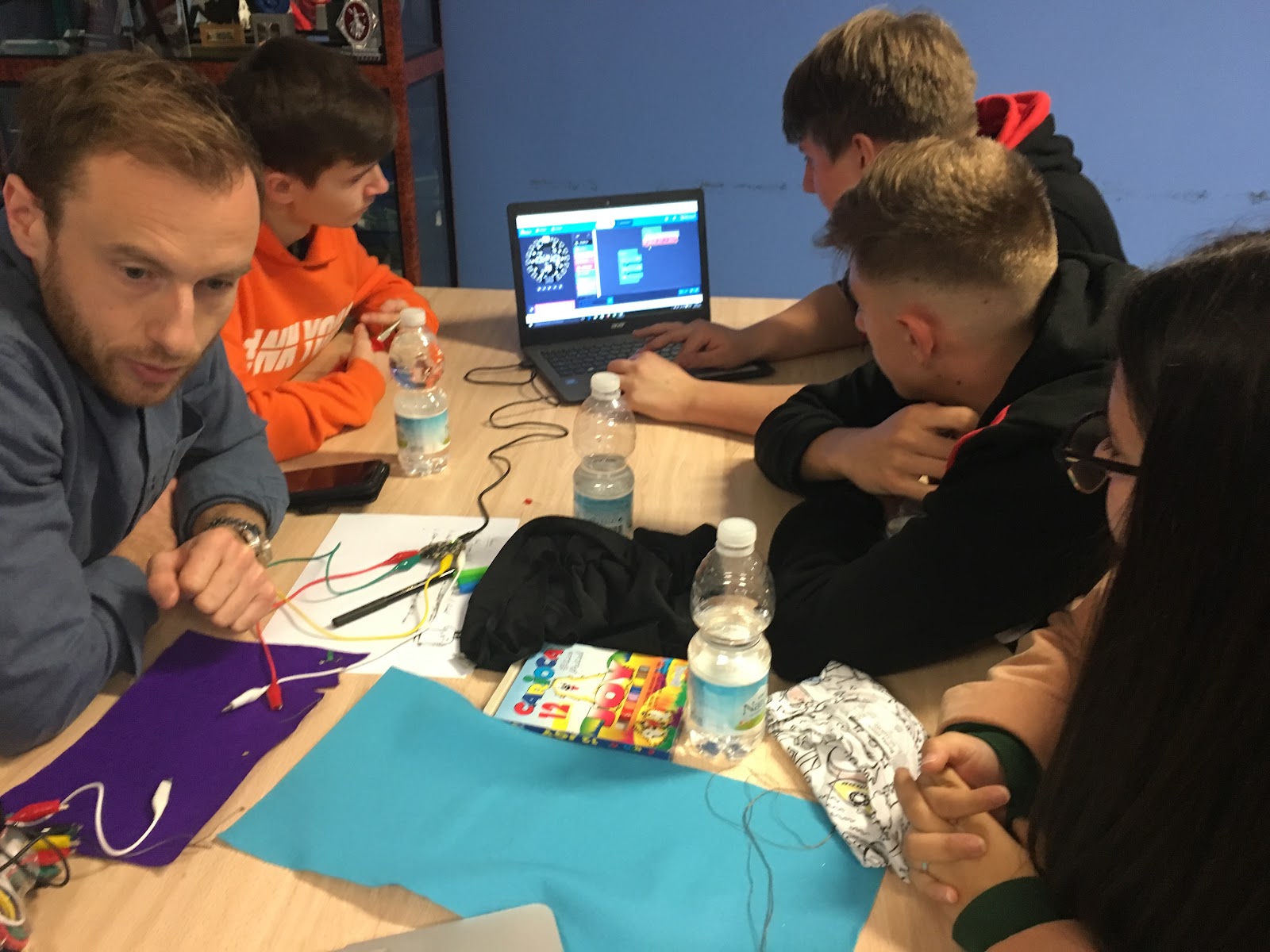

Teams work with the Circuit Playground Express board. This board integrates different sensors that can be programmed. Teams learn block programming. Each team thinks of a project, adding a board to a cloth piece with conductive thread. During the morning, teams work on their designs and present them in the end. Some ideas are really creative, and thought to help people, like a t-shirt that allows a blind person recognize the colours.


During the coffee break we all have a look at the logo exhibition in the main corridor. Everybody can vote on their favourite Logo. The 3 most voted logos come to a Jury, (art department teachers) who will decide, taking into account technical issues.
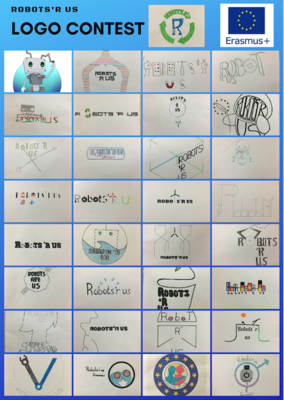

After the meal offered at the school restaurant, we meet again at 17:00 for the Forum discussion.

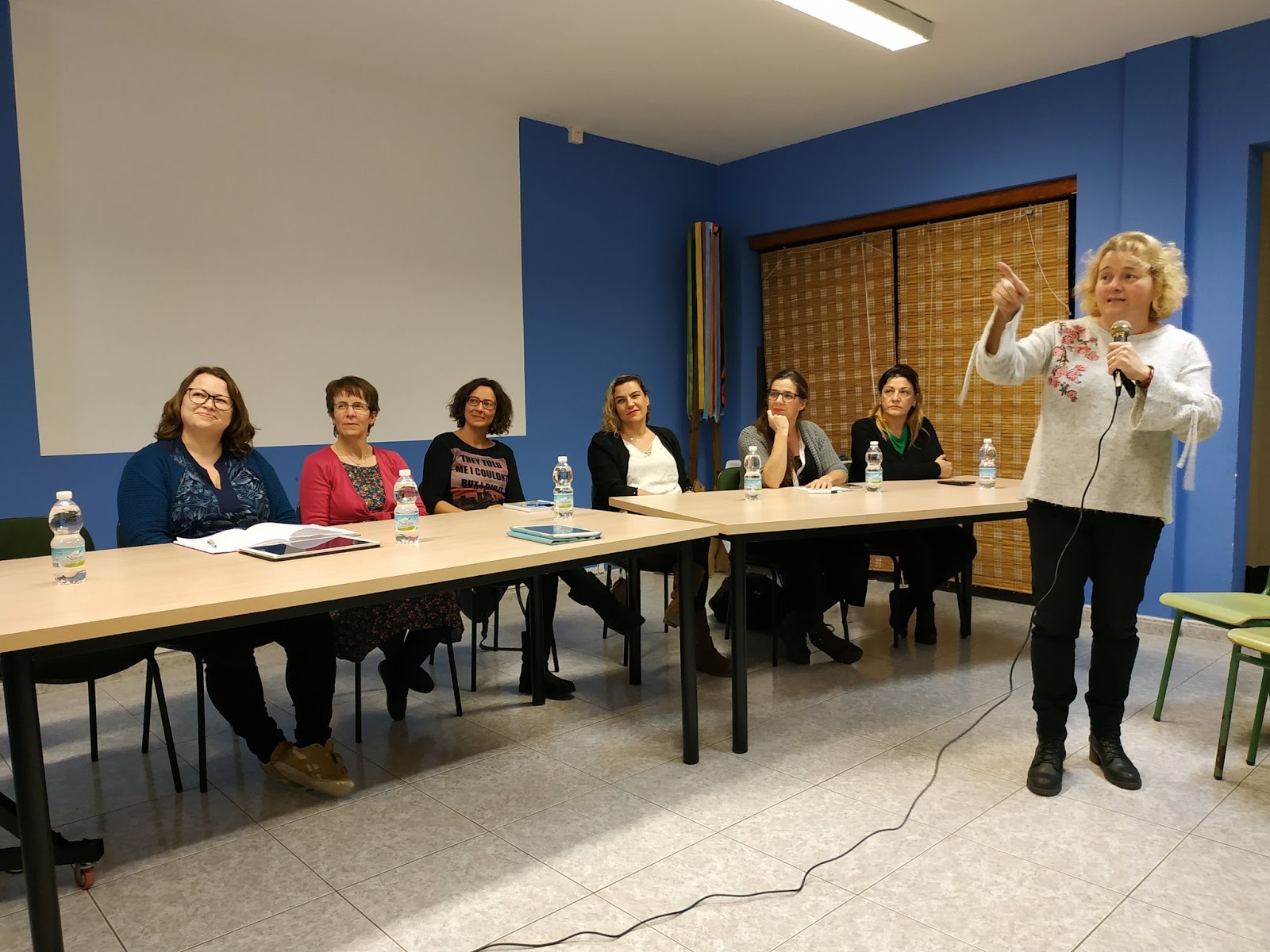

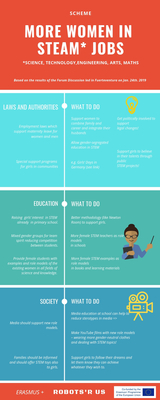
This is an Infography with the outcomes of our Forum Discussion
25.01.19 We meet at 8:30 to make an evaluation of all topics we have handled during the meeting. Here is a picture of the result:
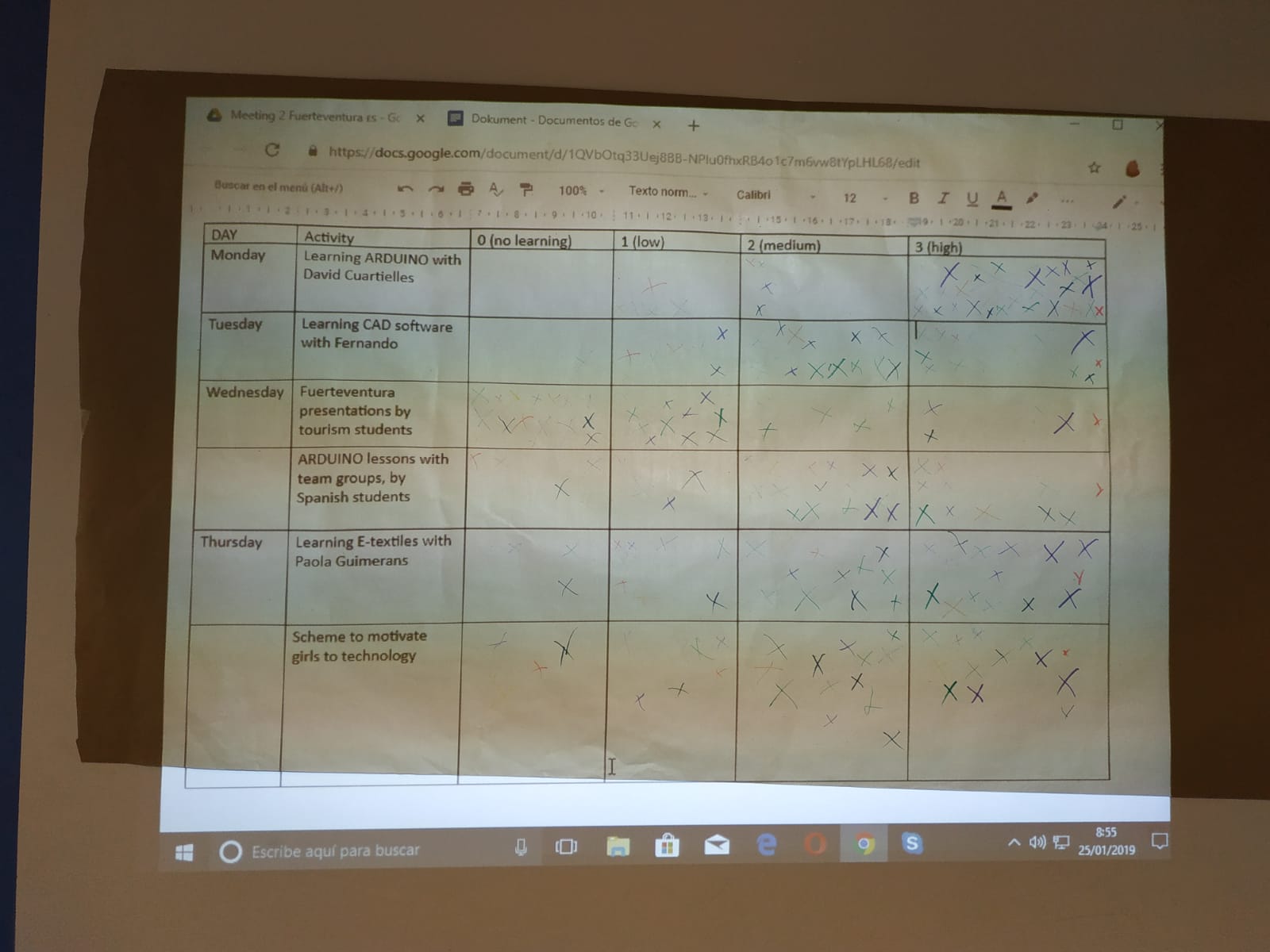
Students and teachers agree to have learned quite or a lot in almost all topics. Nevertheless, students seem to prefer workshops to talks, and would rather be active. Workshops on Arduino and E-Textiles were highly appreciated by all.
After the evaluation, we take the bus and drive to Corralejo in the north of the island. There we meet Alina Kunz, from the non government organization @limpiaventura. They give us a talk about plastics in the sea, and what effect they have in animals and plants, as well as the most common garbage we can find in the coastline. After that, they provide us with gloves and bags, and we spread along the beach to clean.
We spend about 1,5 hours there and collect a lot of plastic rests, glass bottles, or smaller parts, lollipop sticks, plastic ropes and nets, and so on. Students work hard, and feel quite satisfied with the activity.




After the hard work, we move to Cotillo, where we share lunch and some free time on the beach. The bus returns to Puerto del Rosario at 17:00
In the evening we meet at 19:30 at school to enjoy a meal prepared by the students of the hospitality department at IES Puerto del Rosario. This is our farewell dinner. Students leave after dinner, to celebrate on their own. and teachers share some more free time with live music at school.

